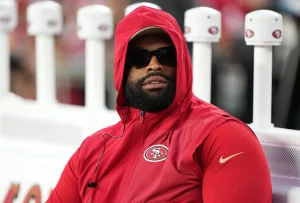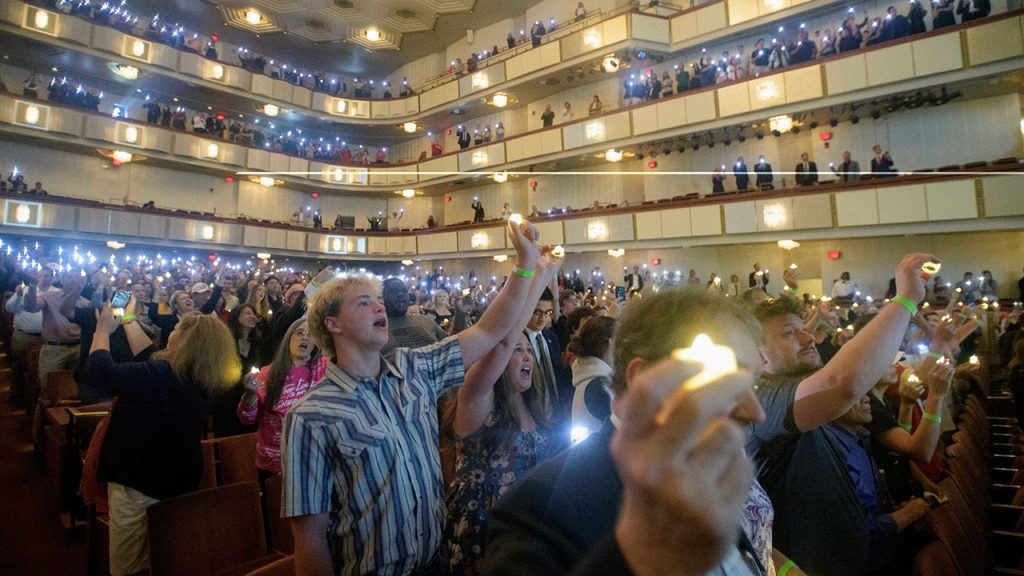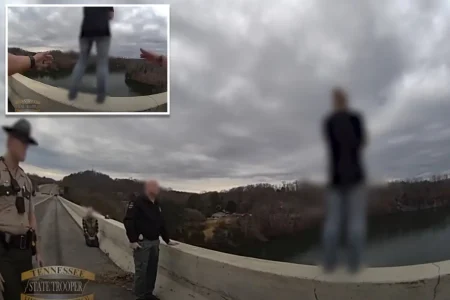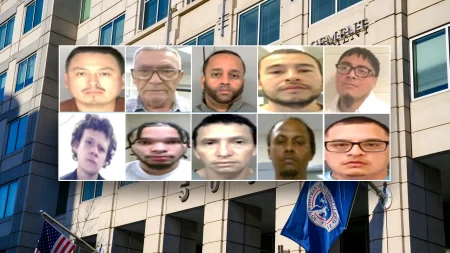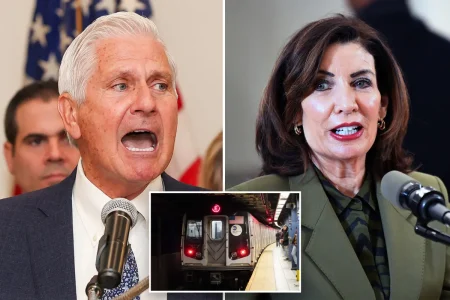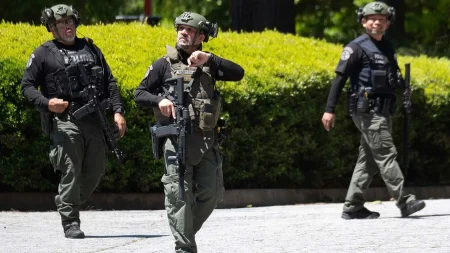Honoring Charlie Kirk: A Memorial Service Filled with Hope Amidst Tragedy
In a solemn yet spirited gathering at the Kennedy Center in Washington, D.C., hundreds of mourners came together on Sunday evening to celebrate the life and legacy of Charlie Kirk. The 31-year-old political activist’s life was tragically cut short by an assassin’s bullet the previous week, sending shockwaves through political and conservative circles nationwide. The memorial service, while marked by profound grief, also resonated with the themes that defined Kirk’s life – faith, freedom, and family. Attendees, many dressed in black or wearing shirts and pins emblazoned with the word “freedom,” formed long lines outside the venue, eager to pay their respects to a man whose influence extended far beyond his years.
Inside the Kennedy Center, the atmosphere reflected the duality of the moment – the weight of loss balanced against the celebration of a purposeful life. Young children ran through the aisles as their parents joined in praise and worship songs, creating a faith-filled environment that seemed to embody Kirk’s own values. House Speaker Mike Johnson was among several Republican leaders who addressed the gathering, capturing the national mood when he described the aftermath of Kirk’s death as “a mixture of unspeakable sadness and grief and anger and even fear.” Johnson spoke of a “dark shadow” cast over the country but emphasized that Kirk “would never want us to be overcome by despair, he would want exactly the opposite.” This sentiment became the underlying theme of the evening – that honoring Kirk meant embodying his approach to life rather than surrendering to darkness. “The best way to honor his memory and to honor his unmatched legacy is to live as Charlie did,” Johnson urged the assembled mourners.
Members of the Trump administration offered their reflections as well, including White House Press Secretary Karoline Leavitt, Director of National Intelligence Tulsi Gabbard, and Health and Human Services Secretary Robert F. Kennedy Jr. Gabbard’s words seemed particularly resonant as she acknowledged the brevity yet profound impact of Kirk’s life. “His impact here and around the world is profound, and it is a beautiful thing to see it playing out now,” she noted, before offering a meditation on mortality that seemed to capture Kirk’s own philosophy. “Ultimately, for every one of us, the time that we have in this world is temporary,” Gabbard reflected. “Our time will come sooner or later. And so the critical question that we have for ourselves is whatever time we have, what are we doing with it? How are we making the most of every day that we have?” These questions hung in the air, challenging those present to consider their own paths in light of Kirk’s example.
The memorial service revealed intimate aspects of Kirk’s character and convictions through personal anecdotes shared by those who knew him. Karoline Leavitt recalled Kirk’s sincerity and encouragement, particularly highlighting his belief that the greatest legacy one can leave is family. “He encouraged young people to get married and to have children. It is our most important mission on this earth,” she shared, touching on a cornerstone of Kirk’s message to younger generations. This focus on family values clearly resonated with many in attendance, as did stories of Kirk’s personal interactions and mentorship of conservative youth. Throughout the service, speakers painted a portrait of a man whose political activism was deeply intertwined with his faith and whose public persona was consistent with his private character – a rarity in political spheres where authenticity is often sacrificed for expediency.
Robert F. Kennedy Jr. offered perhaps one of the most poignant moments of the evening when he shared how he and Kirk had become “spiritual brothers” after meeting during a podcast interview in 2021. Kennedy then related a deeply personal story about dealing with grief in his own family, recounting a conversation with his mother who had endured more than her fair share of tragedy. “When my brother David died, I had a conversation with my mother… And I asked her… does the hole they leave in you when they die, does it ever get any smaller?” Kennedy recalled asking. His mother’s response captured the essence of grieving while continuing to live meaningfully: “No, it never gets any smaller. But our job is to build ourselves bigger around the hole.” This wisdom seemed to provide a framework for those mourning Kirk – not to expect the pain to diminish, but to grow around it, allowing both the grief and the inspiration of his life to coexist.
As the memorial service concluded, the Kennedy Center seemed transformed not just by sorrow but by a collective determination to carry forward Kirk’s vision and values. The evening had balanced religious reverence with political significance, personal loss with public resolution. For the hundreds who attended and many more watching remotely, the service offered not just closure but a beginning – an invitation to take up the mantle of engagement that characterized Kirk’s approach to civic life. The memorial’s most lasting message appeared to be that while an assassin could end Kirk’s life, his legacy would continue through those inspired by his example to live purposefully, speak boldly, and value family and faith above all. As mourners filed out into the Washington night, there seemed to be a shared understanding that honoring Charlie Kirk meant more than remembering his life—it meant living with the same conviction and courage that had defined his brief but impactful journey.
